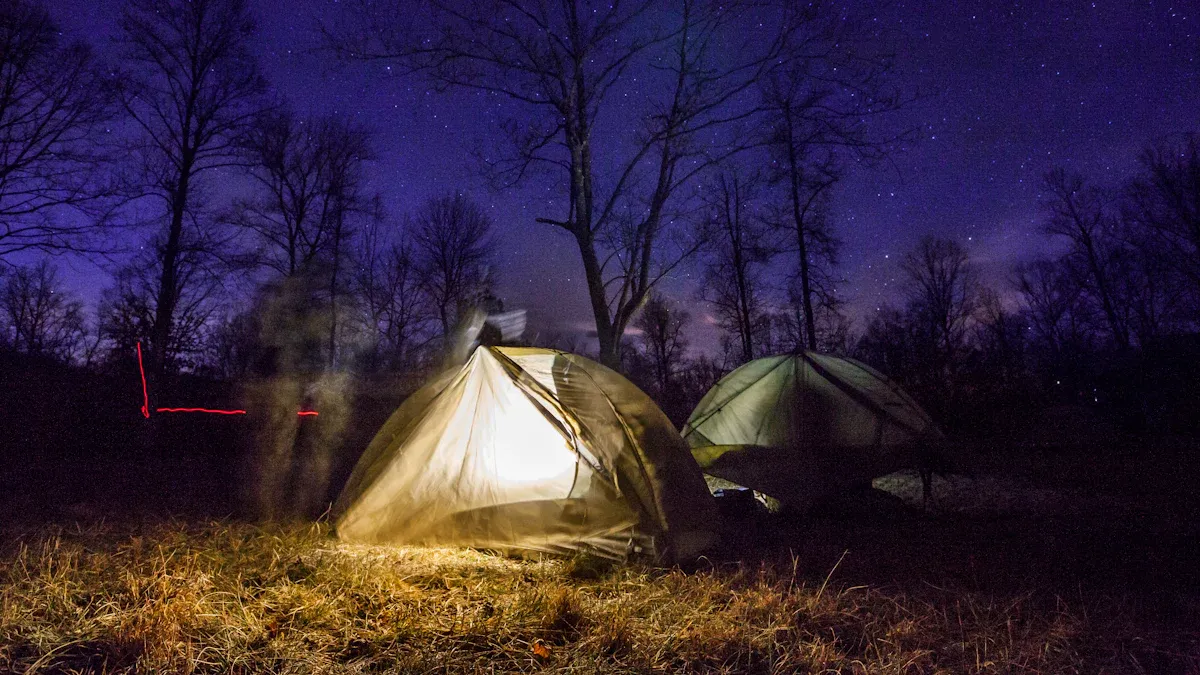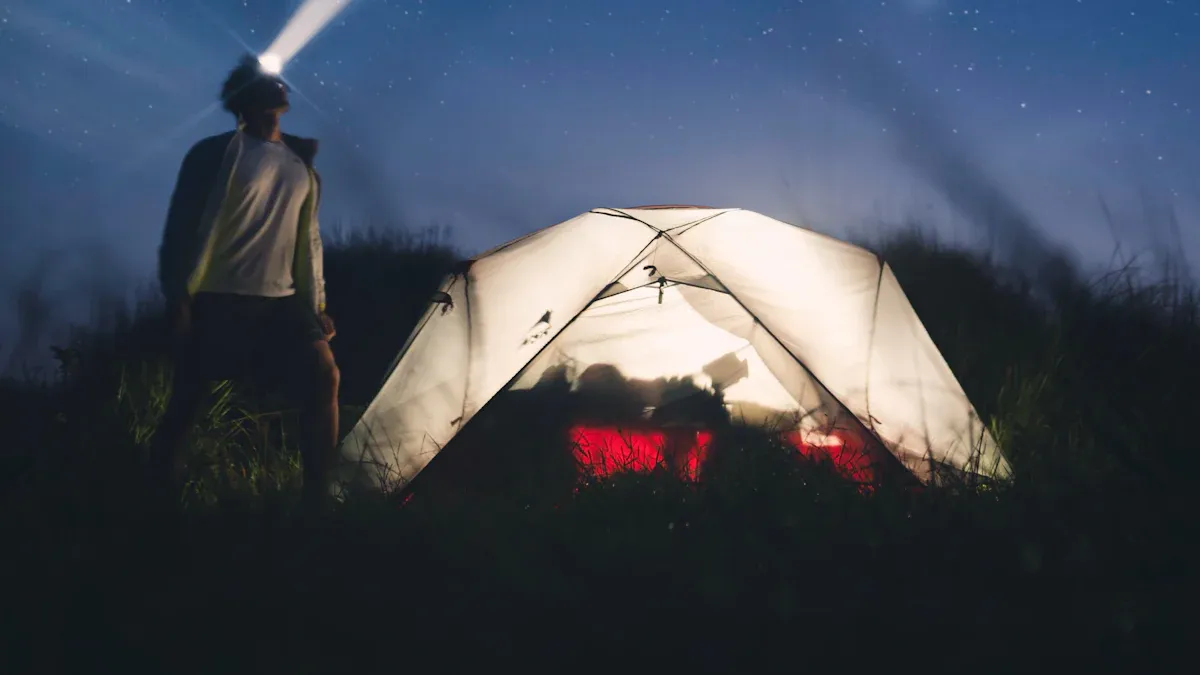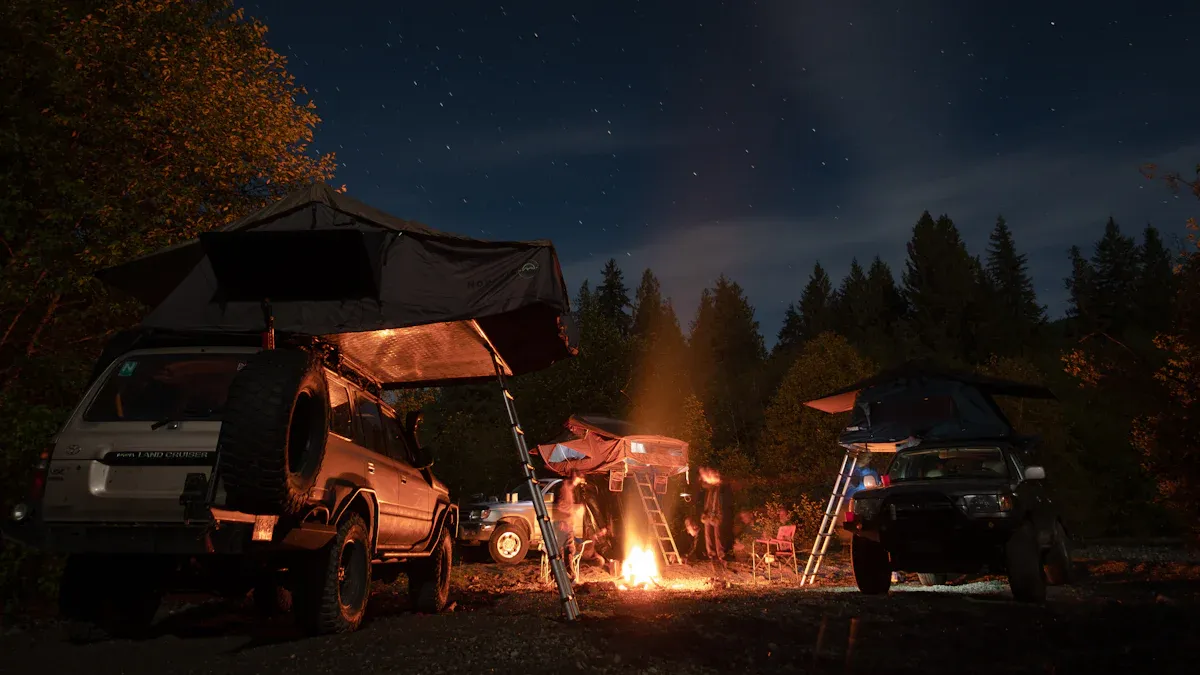Why a headlamp should be a must-have for your next camping trip

A headlamp is more than just a light source—it’s an essential tool for any camping trip. Imagine navigating unfamiliar trails at night or safely moving around your campsite without fumbling in the dark. A headlamp keeps your hands free, making tasks like setting up a tent or cooking much easier. It also helps you avoid tripping hazards like tent spikes or logs and can even deter encounters with wild animals. Unlike the helius flashlight, a headlamp stays securely on your head, ensuring you’re always ready for nighttime adventures.
Key Takeaways
A headlamp lets you see without using your hands. It helps with tasks like pitching a tent or cooking safely.
A headlamp keeps you safe by lighting up dark paths. It helps you avoid tripping over things at night.
You can use a headlamp for many activities. It works for hiking, fishing, or even nighttime gardening.
Reasons Why You Need a Headlamp

Hands-Free Lighting for Convenience
A headlamp is the ultimate tool for hands-free lighting. Imagine trying to pitch a tent or cook dinner at your campsite while holding a flashlight. It’s frustrating, right? With a reliable headlamp, you can keep your hands free and focus on the task at hand. Whether you’re reading a map, knitting by the fire, or even changing diapers in the dark, a headlamp makes everything easier.
Tip: A headlamp isn’t just for camping. It’s also great for activities like walking in dim places or even hand quilting at night.
For outdoor enthusiasts, this hands-free source of light is a game-changer. It lets you move freely and tackle any challenge without juggling a flashlight.
Enhanced Safety on Tricky Trails
Navigating trails after sunset can be risky, but a headlamp ensures you stay safe. Poor visibility can hide obstacles like uneven terrain, rocks, or tree roots. A reliable headlamp lights up your path, helping you avoid these hazards. It also keeps you aware of potential wildlife encounters, giving you peace of mind during your hike.
Pro Tip: Always carry a headlamp when exploring unfamiliar trails. It’s a small tool that can make a big difference in your safety.
For outdoor enthusiasts, safety is non-negotiable. A headlamp provides the confidence you need to enjoy your adventure without worrying about unseen dangers.
Versatility for Nighttime Activities
A headlamp isn’t just for hiking—it’s perfect for a variety of nighttime activities. Love fishing? Use your headlamp to attract fish to your bait. Into stargazing? Switch to the red light mode to preserve your night vision. From rock climbing to gardening, a headlamp adapts to your needs.
Here’s why outdoor enthusiasts swear by its versatility:
It’s ideal for setting up tents or cooking at night.
It’s perfect for early morning or late evening treks.
It’s even useful during power outages, letting you handle chores hands-free.
With adjustable brightness levels, a headlamp is more adaptable than traditional flashlights. It’s the go-to tool for anyone who loves exploring the outdoors.
Key Features to Look for in a Headlamp
Brightness and Beam Distance
When choosing a headlamp, brightness and beam distance are two of the most important features to consider. For close-up tasks like reading or cooking, a brightness level of 100 lumens or fewer works perfectly. But if you’re hiking or navigating trails at night, you’ll need a headlamp with over 300 lumens for good visibility.
Beam distance also plays a big role in how useful your headlamp will be. A longer beam helps you spot trails ahead during night hikes, while a wider beam is better for campsite activities like setting up your tent. Models like the Fenix HP25R and Zebralight H600w Mk IV are known for their excellent beam distance and clarity, making them great options for outdoor adventures.
Tip: Look for a headlamp with adjustable brightness levels so you can switch between tasks easily.
Battery Life and Power Options
Battery life can make or break your camping experience. Rechargeable batteries are great for saving money in the long run and are better for the environment. However, they require a power source and can have a higher upfront cost. On the other hand, disposable batteries are convenient and work well in extreme temperatures, but they can get expensive over time.
Type of Battery | Advantages | Disadvantages |
|---|---|---|
Rechargeable (NiMH) | Cost-effective, eco-friendly, long-lasting | Needs charging, higher initial cost |
Disposable (Alkaline) | Easy to use, long shelf life | Not rechargeable, more expensive in the long run |
Choose the option that best fits your camping style and needs.
Comfort and Lightweight Design
A comfortable and lightweight headlamp is essential for long camping trips. Heavy headlamps can strain your neck and make you feel fatigued. Look for one made with soft, breathable materials to prevent irritation and sweating. Adjustable straps are also a must for a snug fit.
A lighter headlamp not only feels better but also stays in place during movement, making it ideal for active campers.
Durability and Weather Resistance
Durability is key when you’re out in the wild. A good headlamp should withstand rough handling and harsh weather conditions. Check the IP rating to understand its resistance to dust and water. For example, an IP67-rated headlamp can handle total dust ingress and immersion in water up to 1 meter.
IP Rating | Dust Protection | Water Protection |
|---|---|---|
IP65 | Total dust ingress | Low-pressure water jets |
IP67 | Total dust ingress | Immersion up to 1 meter |
IP68 | Total dust ingress | Long-term immersion under pressure |
Pro Tip: A weatherproof headlamp is a lifesaver during unexpected rain or emergencies.
Headlamp vs. Other Lighting Options

Advantages Over Flashlights Like the Helius Flashlight
When it comes to camping, a headlamp outshines flashlights like the helius flashlight in many ways. First, it offers hands-free lighting, which is a game-changer when you’re setting up a tent or cooking in the dark. You don’t have to juggle a flashlight while trying to complete tasks. Instead, the light stays securely on your head, letting you focus on what matters.
Headlamps are also compact and lightweight, making them perfect for tight spaces or activities like climbing and biking. Unlike a flashlight, which you have to hold, a headlamp frees up your hands for multitasking. Adjustable straps ensure a snug fit, so you can move around without worrying about it slipping off.
Note: Flashlights like the helius flashlight may be more durable, but they limit your ability to perform hands-on tasks efficiently.
Why It’s Better Than Lanterns
Lanterns are great for lighting up a campsite, but they can’t compete with the versatility of a headlamp. A headlamp provides focused, hands-free lighting, making it ideal for activities like navigating trails or setting up camp. Lanterns, on the other hand, require a flat surface and don’t offer the same mobility.
Headlamps also come with adjustable brightness levels and beam patterns, so you can customize the light to suit your needs. Whether you’re hiking, climbing, or cooking, a headlamp adapts to the situation. Lanterns are bulkier and less practical for tasks that require precision or movement.
Tip: Use a headlamp for tasks that demand mobility and precision. Save the lantern for group activities like playing cards or sharing stories around the fire.
Ideal Scenarios for Using a Headlamp
A headlamp is your best friend in the dark. It’s perfect for setting up a campsite, navigating tricky terrain, or even finding something in your backpack at night. The hands-free design keeps you safe by preventing falls and letting you focus on the task at hand.
Some headlamps even include an SOS mode, which can be a lifesaver in emergencies. Whether you’re hiking, climbing, or just walking to the restroom at night, a headlamp ensures you’re prepared. Its powerful beam cuts through the darkness, giving you confidence in any situation.
Pro Tip: Always pack a headlamp for your camping trips. It’s lightweight, versatile, and essential for nighttime adventures.
A headlamp is an essential piece of equipment for any camping trip. It offers hands-free lighting, user-friendly features, and adaptable brightness for activities like hiking or cooking. Whether you’re spelunking, kayaking, or walking your dog, it’s a camping essential. Don’t forget to bring a headlamp—it’ll enhance every nighttime adventure during your camping and hiking experiences.
FAQ
How do I choose the right headlamp for my camping trip?
Focus on brightness, battery life, and comfort. Look for adjustable straps and weather resistance. A lightweight design ensures you stay comfortable during long adventures.
Tip: Test the headlamp before your trip to ensure it meets your needs.
Can I use a headlamp for activities other than camping?
Absolutely! Use it for running, biking, or even fixing things at home. Its hands-free design makes it perfect for any task requiring focused light.
How do I maintain my headlamp for long-term use?
Keep it clean and dry. Remove batteries when not in use to prevent corrosion. Rechargeable models need regular charging to maintain battery health.
Pro Tip: Store your headlamp in a cool, dry place to extend its lifespan.
See Also
Essential Advice for Selecting Your Ideal Camping Flashlight
Key Suggestions for Picking the Best Camping Flashlight
Comprehensive Guide to Buying a Headlamp: Key Factors
Enhance Your Camping Experience: Comparing Lanterns and Flashlights
